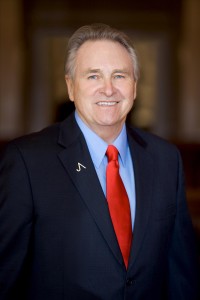“The core reason [Proposition 30] brought people together was a belief in schools and universities and the capacity of government to make wise investments that benefit all of us.” San Jose Mercury News, November 6, 2012.
The above quote well summarizes the hue and cry made to the voters by Governor Brown to convince them to approve two “temporary” tax increases a little over a year ago. At some events, the Governor even brought along Sutter, California’s beloved “First Dog,” to convince voters to tax themselves, even though California already has some of the highest taxes in the nation. The voters, intent on protecting public education and trusting promises that the tax increases would only be temporary, approved Proposition 30.
Now the Legislative Analyst is projecting a $5.6 billion surplus for the coming budget year, significantly more than state financial experts predicted. We are all grateful that schools will stay open and those in need will continue to be served, but there are other priorities that the Legislature seems slow, or even unwilling, to address. Certainly, more revenue will make crafting a budget easier, but at some point we must concede that priorities matter. Rather than rubbing their hands together and posturing about new spending on this or that, shouldn’t we glean some wisdom from our very recent history of overspending and take a hard look at our existing obligations before we decide to go hog wild?
For starters, our state is facing a wall of debt totaling an almost incomprehensible $355 billion, but that’s not all – there are several other big money items on the docket to which those in power seem content to ignore.
Last year, Governor Brown charged the Department of Water Resources with the authority to design and construct a $25 billion, 30-mile long tunnel system to divert Northern California water through the Delta and to Southern California. It is presumed that the project will be paid for through higher water bills imposed on those deemed to benefit. If approved at the end of this year as planned, how much of this new expense will fall on the taxpayers? And, does anyone truly believe this ill-conceived project would ever be completed without excessive cost overruns?
The High Speed Rail Authority still plans to build a $68 billion rail system with only, at best, $11 billion identified so far to pay for it. Other debts include the state’s two public employee pension systems. CalSTRS is only 67 percent funded, while CalPERS is only 70 percent funded. Together, the state’s unfunded liabilities for pension and retiree health care total approximately $190 billion, and the Legislature has yet to demonstrate much political will to tackle it.
Counties have been shorted hundreds of millions in recent years as a result of budget loans and diversions that continue to impact public safety and local services. Not to mention, where is the state’s commitment to helping counties deal with the Governor’s realignment mandate that is forcing local jails to release dangerous inmates into our communities before they have served their time?
Then there’s our state highway infrastructure, which is in shambles. Rather than use some of the temporary revenue for one-time capital improvements and deferred maintenance on highways and other vital public works projects, some in the Legislature prefer to ignore these basic needs and would rather commit surplus funding to broad new, ongoing programs.
The Democrat leadership has already stepped up with a proposal to create a massive new entitlement program – universal transitional preschool, a program that will add $1 billion (at least) to state baseline funding. Another Senator from Los Angeles wants to expand the Affordable Care Act (Obamacare) in California to cover undocumented immigrants. Is anyone really surprised that State Superintendent Tom Torlakson has already called for the “temporary” Proposition 30 taxes to be “renewed” – or, more accurately, made permanent?
This budget does nothing to attract new businesses to the state, nor does it improve the economic climate for businesses to hire new workers. Before the state spends more money on new programs or considers raising or renewing taxes, I maintain that we should pay down debt, get existing obligations under control and re-focus on growing our economy.
The budget is a reflection of our priorities. From where I sit, our priorities should be to honor Proposition 30’s commitment to education, aggressively reduce our state’s wall of debt, ensure adequate revenue for public safety, promote economic development to increase jobs, address our crumbling infrastructure, and honor the voters’ trust by ensuring that Proposition 30’s temporary taxes are, in fact, temporary.
Senator Jim Nielsen (R-Gerber) is Vice Chair of the Senate Budget Committee.


